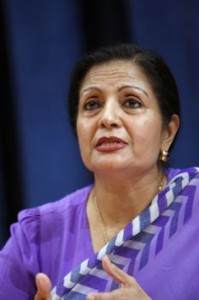Not only is women’s personal development hampered by disproportionate water-collection duties, their [...]]]>
Not only is women’s personal development hampered by disproportionate water-collection duties, their limited access to productive resources (because of gender discrimination), including irrigation, also causes lower food production overall and thus hunger in developing countries.
You want a side of statistic with that? No problem.
Investing in women-owned agriculture businesses could bring the number of the world’s hungry down by 100 to 150 million people.
Sit with that number for a second and then continue reading.
As Thalif Deen recently reported (reiterated yesterday by Lakshmi Puri, deputy executive director of UN Women) women spend more than 200 million hours per day collecting water.
That’s 40 billion hours per year.
71 percent of the water collection burden falls on women and girls.
We all know the popular media image of women water bearers, but the development loss that occurs for women in that act is rarely quantified.
Women’s disproportionate burden of fetching water limits their personal development, productive capacity and community engagement, including school attendance, market activity and their involvement in local leadership and decision-making.This also has negative effects on building and maintaining peace.
Progress has been made on improving secure water supplies in developing countries and reducing walking distances, but “783 million people still remain without access to an improved source of drinking water,” according to Puri.
She emphasised that “Creating a water- and food-secure world requires putting women and girls at the centre of water and food related policies, actions and financing.”
Rather than seeing women as “beneficiaries of greater water and food security,” they ought to be seen as contributors to greater progress.
Puri lists four urgent actions to “unleash their potential” [emphasis and formatting mine]:
1. Women need to be recognised as water managers, farmers and irrigators, who contribute to ensuring sustainable food production and consumption and to safeguarding the environment.
This must be done in laws, policies and through social awareness programmes in communities.
2. Governments and other partners need to ensure that women are empowered along the water and food supply chain, so that their food production and water management roles are supported.
Improvements in infrastructure services— especially water and electricity—can help free up women’s time spent on domestic and care work. […]
3. We need to address the multifaceted gender discriminations in accessing and controlling productive resources.
Women must be provided with technical training on water management, irrigation, rainwater harvesting, and rain-fed agriculture.
4. Women must be recognised as decision-makers in water governance.
This involves reducing membership fees and broadening the mandate of irrigation schemes to acknowledge and include multiple water users.
]]>
What is holding back women and girls from reaching their full potential? Social institutions – defined as laws, social norms and practices – play a powerful but often invisible role in determining women and girls’ access to opportunities, resources and power. A girl who is [...]]]>
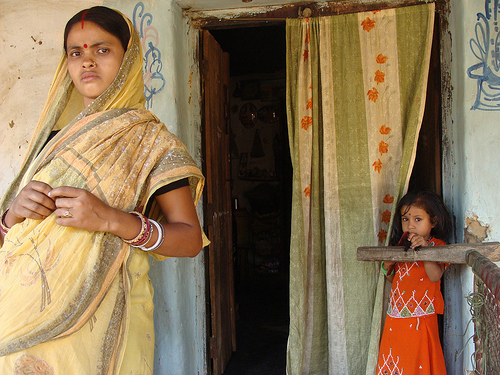
A pregnant mother and her daughter in the rural Purulia district of West Bengal state in Eastern India struggle against the country’s “son preference”. Credit: Sujoy Dhar/IPS
What is holding back women and girls from reaching their full potential? Social institutions – defined as laws, social norms and practices – play a powerful but often invisible role in determining women and girls’ access to opportunities, resources and power. A girl who is forced to marry early and then begins child rearing is not likely to finish her education, which then limits her employment opportunities. Her lower status in the family, which may be enshrined in national law, will not only affect her own well-being but also that of her children. If she is in an abusive relationship, she will have limited access to economic resources inside the household and her ability to make decisions about her children’s well-being will be diminished. If the bank then requires her husband’s permission to take out a loan or open a bank account she will not be able to start a small business.
The OECD Development Centre’s 2012 Social Institutions and Gender Index (SIGI) provides a stock-take of where countries currently stand on discrimination against women. While other measures of gender inequality tell us about gender gaps in education or employment, the SIGI focuses instead on what drives those gaps, such as women’s status in the family, gender-based violence and restrictions on the right to own land and property.
The results of the 2012 SIGI show that while there has been promising progress in some aspects of discrimination against women, there is still much more to be done. Areas of progress include the introduction of laws to combat domestic violence, an overall decline in early marriage and some countries showing improvement with respect to missing women. Certain forms of discrimination against women remain widespread. Out of 121 countries covered in the 2012 SIGI, 86 have discriminatory inheritance practices or laws. It is clear that laws are not enough to change attitudes – on average, for countries ranked in the SIGI, around half of women believe domestic violence is justified in certain circumstances. The preference for sons over daughters – a particularly grave form of discrimination – remains evident in South Asia, Central Asia and South-East Asia.
Latin America is the top-ranking region in the 2012 rankings, with strong legal frameworks to promote gender equality in the family and an increasing number of laws to combat violence against women. The region has the highest share of women in parliament among developing countries: in 2011, 20% of parliamentarians were women and 12 countries in the region currently have quotas to promote women’s representation in national governments.
Sub-Saharan Africa and Middle East and North Africa show the highest levels of discrimination against women and girls. Many countries have discriminatory laws in relation to marriage and property rights or do not have adequate protection against gender-based violence. Over 75% of women in Guinea, Ethiopia, Somalia, Congo, the Democratic Republic of Congo and Mali agree that domestic violence is justified in some circumstances. However, there is reason to be optimistic. In Rwanda and South Africa, for example, the introduction of political quotas has led to a greater representation of women in politics. In Morocco, reforms to the Family Code have granted women equal rights in marriage and the country has also introduced quotas to boost women’s political representation.
One salient finding of the 2012 SIGI is that several bottom-ranking countries are affected by conflict, fragility and insecurity. This highlights the urgent need for gender to be a top priority in peace building and conflict prevention efforts, particularly given that no fragile state has achieved a single MDG. Moreover, the SIGI findings for countries such as Nepal and Rwanda highlight that post-conflict settings are also opportunities to transform social norms through the introduction of gender equality reforms and programmes. Women in Nepal gained 33% of the seats in the 2008 Constituent Assembly elections, an unprecedented achievement for Nepal and South Asia at large. Rwanda, for instance, has introduced comprehensive laws on violence against women.
The 2012 SIGI data also shows that high levels of discrimination against women is related to poor development outcomes in areas such as education, women’s employment, child mortality and maternal mortality. It is evident the human and economic costs of not acting on discrimination against women are significant. To achieve lasting change, policies and programmes must go beyond quick-fixes and tackle the deep-seated social norms which are the root cause of gender inequalities. Transforming social norms must be a priority for policy-makers and donors to enable women and girls to fulfill their aspirations and contribute to their communities and economies.
]]>Simple things sometimes seem the most difficult to accept. We protest that the hardest place to tackle gender inequity is in the privacy of the home and then we spend little or no time in our work on women’s rights, feminism and masculinities examining the area where we interact most in [...]]]>
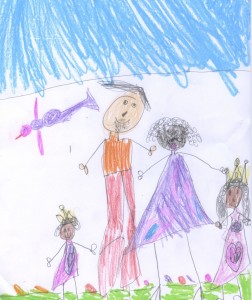
Are we missing something in the gender debate? Credit: Zuwa Davies
Simple things sometimes seem the most difficult to accept. We protest that the hardest place to tackle gender inequity is in the privacy of the home and then we spend little or no time in our work on women’s rights, feminism and masculinities examining the area where we interact most in the home – in the raising of our children.
Perhaps I am not looking very hard but I have yet to see a sympathetic feminist analysis on motherhood and parenting. Most of the women’s movement seem to only analyse childbearing and caring from an ‘unfair burden of care’ perspective. This ignores the rich rewards many modern women feel from their roles as parents and, in some cases, makes even enlightened women feel ‘guilty’ about valuing themselves as mothers and integrating careers and family life.
I feel sometimes that my own work on fatherhood is seen as a nice touchy feely subject for me to be fascinated with – but not really mainstream from a gender transformative perspective. Many men in our movement seem caught in the ‘men as monsters / deficient men’ mode – apologising forever for our inadequacies and violence and unable to move to a more holistic view of masculinity and promoting our male caring roles rather than concentrating on only challenging our ‘dark side’.
These binaries of opposition between male and female activists don’t take us very far and offer little in the search for gender equity between the sexes beyond mudslinging at each other. In the meantime a whole new generation of children is being raised with the same old gender stereotypes and attitudes.
The best place to change their attitudes is in the home and research shows that the best time is from the earliest age possible. Yet very little support is given to parenting by the state and agencies with a real stake in gender transformative work.
In Zimbabwe the African Fathers Initiative is calling for a gender sensitive Parenting Action Plan (PAP) as an urgent priority. This plan will, amongst other things, give advice to all parents about raising children without recourse to physical punishment such as smacking and beating. It will enshrine the rights of children to emotional and financial support from both parents even when their own adult relationship is in trouble or breaks down completely. We want a parenting advice hotline and agencies and workers trained to give advice across the country.
Any society that is failing to adequately care for and raise its children, whatever its other successes, is a failing society. In addressing this failure seriously we can impart new inter-generational values to our children around care and respect for each other and minimize the restrictive gendered roles that are producing so much pain and suffering for young children who are our next generation of parents.
This is the baby elephant in the room that both men and women in the gender movement need to acknowledge and work with.
Trevor Davies is Director of the African Fathers Initiative, which seeks to promote gender equitable care in parenting and the promotion of more active and involved fatherhood as a key driver of child development.
]]>International Women’s Day has come and gone and government and civil society representatives of women have packed up and flown back home from the Beijing +15 review at the annual Commission on the Status of Women (CSW) in New York.
For International Women’s Day there was plenty of activity, with celebrations and commemorations [...]]]>
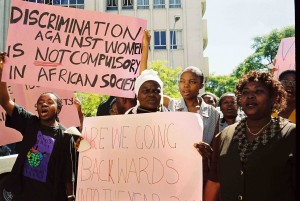
For how long do we have to keep demanding our rights? Credit: Mercedes Sayagues/IPS
International Women’s Day has come and gone and government and civil society representatives of women have packed up and flown back home from the Beijing +15 review at the annual Commission on the Status of Women (CSW) in New York.
For International Women’s Day there was plenty of activity, with celebrations and commemorations around the world. More ordinary women and men now know about this international day to celebrate women than ever before. Just ten years ago you might have struggled to get a significant positive response if you went out into the streets and asked random people if or what they knew about March 8th.
The theme for this year, “Equal rights, equal opportunities, progress for all”, mirrors what the first organizers of IWD had in mind 100 years ago when they organised for millions of women and men to come out on the streets in Europe to demand equal rights for women.
But this year I did not get the feeling that 8th March was used as a real rallying point for activism on a particular issue on women. This seems to have been the general feeling coming out of the Beijing +15 meet in New York as well.
Following the events there I got the impression that the feeling was one of lost gains and lost focus in contrast to the vibrant activism of that global meeting of women 15 years ago. We have ever multiplying to-do lists of things that need to be achieved within set time frames but the progress in terms of women’s lived realities has been very slow.
One of the statements in Wendy Harcourt’s guest blog from the CSW last week rang true for me where she quotes a delegate from Latin America saying, “why do we expect the UN and governments to take up our agenda? We have to make our own agenda.”
Part of that agenda relates to the proposed new UN gender entity to be headed by a new Under Secretary-General that women’s rights activists have been pushing for over the last three years. But not only is progress on that machinery slow and mired in controversy, it still places the onus for progress on the UN and governments.
Here in Southern Africa there is also growing dissatisfaction from young women who feel the women’s movement has not created room for them. For the most part, they are going out and creating their own agenda that the broader women’s movement needs to acknowledge and actively support if we are to move forward.
]]>This question has been puzzling me since a late-night, noisy get together with friends where we got talking (some might say gossiping) about the alleged cross-party sexual politics taking place in our government. The men, it was said, were using sex as a strategy to silence the women from the opposite camps. The [...]]]>

Queen Elizabeth I kept a reign on power by becoming "The Virgin Queen" Credit www.PDImages.com
This question has been puzzling me since a late-night, noisy get together with friends where we got talking (some might say gossiping) about the alleged cross-party sexual politics taking place in our government. The men, it was said, were using sex as a strategy to silence the women from the opposite camps. The woman targeted loses her standing once she’s been seduced as it quickly becomes general knowledge among other politicians.
“Once you see that so and so who used to be so vocal has gone quite then you know they’ve been had,” said one friend. Much like the boarding school strategy employed by male students to remove the top performing girl student’s ranking as number one in class I’m told. But, never having been to boarding school, much less a co-educational school, I am not aware.
As much as this dirty trick is an age-old male strategy to silence female opponents, women throughout history have used their sexuality, that is — whom one has sex with (or not), in what ways, why, under what circumstances, and with what outcomes — as a strategy to gain power.
I’m thinking Anne Boleyn, Cleopatra and Eva Peron. Make no mistake about it. These were no dimwitted women bumbling their way to power. Neither were they the most attractive of women. No doubt their intelligence, wit, charm, humour and deep passion to succeed all combined to give them charisma, which played an important part in their sexual allure. And their sexual power lay in this desirability, not in handing out sexual favours.
More recently, we had general head shaking disapproval from many quarters over German Chancellor Angela Merkel and Christian Democratic Union Parliamentary candidate Vera Lengsfeld’s bosomy “We have more to offer” poster, which featured in last August’s election campaign. The posters were put up by Lengsfeld, who said she wanted to give the campaign a bit of humour. Reading up on Lengsfeld I found out she has a degree in Philosophy of Religion and is a civil rights activist which was my confirmation that she really thought this poster idea through. I wonder if there would have been less head shaking if the bosoms had not been middle-aged ones.
The example of all these women got me thinking that male politicians’ strategy of using sex against women could be turned on its head after the style of Anne Boleyn. It seems that sexual unavailability will get you ahead. Anne Boleyn’s “Queen or nothing” strategy worked well with Henry VIII. She refused to be his mistress and all the while his attentions and favours towards her flourished. Eventually he married her, annulling his marriage to Catherine of Aragon. But no sooner had she become Queen than Henry VIII began to lose interest and eventually got around to beheading her.
Elizabeth I (Anne Boleyn’s daughter) perfected her mother’s strategy. She came into power at age 25 despite being declared illegitimate and stayed in power for 44 years until her death. Sometimes called ‘The Virgin Queen’, she never married. Not only did Elizabeth avoid losing her power to a husband by marrying, she also avoided the problem of succession. Personally I’m not convinced Elizabeth was really a virgin, but either way, her strategy of sexual aloofness certainly kept her in the game of politics.
I can just picture many readers are tsk tsking, thinking this type of discussion is not going to help advance the feminist cause. Some will argue that in those days women may have had to use their ‘feminine wiles’ in addition to their intellectual skills to get ahead but now we have to employ ‘fair’ tactics and play strictly by the book. The problem for me is that men’s unfair tactics — violence, money and character assassination being the primary ones — are rarely questioned. In fact, they tend to be rewarded.
Surely denying women use of their sexuality in the game of politics and power is yet another reflection of the power imbalances between women and men where women’s sexual rights are limited while men’s sexual freedom grows. In the so-called “dirty game of politics”, are we stifling women’s progress to the top by refusing them the right to use their sexuality while we applaud men’s use of the same?
]]>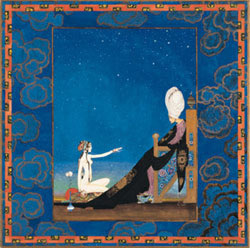 Espero entre indignada y divertida el próximo 8 de marzo, Día Internacional de la Mujer… El anterior me deparó una pasmosa sorpresa. Sobre mi escritorio había una enorme rosa de pétalos amarillos y bordes rojos y una tarjeta dirigida a las mujeres del siglo XXI, en su día.
Espero entre indignada y divertida el próximo 8 de marzo, Día Internacional de la Mujer… El anterior me deparó una pasmosa sorpresa. Sobre mi escritorio había una enorme rosa de pétalos amarillos y bordes rojos y una tarjeta dirigida a las mujeres del siglo XXI, en su día.
“Las mujeres han seducido a los literatos, han vuelto frescos a los piadosos, han empobrecido a los ricos…” “… para ellas se construyen los palacios, se tienden las cortinas, se compran los esclavos y corren las lágrimas…” “para ellas son el almizcle, las joyas y el ámbar, por su causa se reúnen los ejércitos, se construyen los cuarteles, se almacenan las provisiones y se cortan los cuellos…”
El texto es una cita de “Las Mil y Una Noches”, la célebre compilación de cuentos árabes del siglo XI. Y el remitente del supuesto elogio al eterno femenino, Random House Mondadori.
¿Por qué escogieron este texto los encargados de relaciones públicas de Random House Mondadori? Apuesto que les pareció un conjunto de alabanzas y zalamerías exóticas, impactantes y perfumadas.
Pero, ¿cuál es la imagen femenina que describen estas citas? Una creada en el medioevo por el mundo masculino. La mujer era capaz de enloquecer o arruinar al hombre, de hacerlo embarcar en las empresas más locas, audaces y crueles, un ser por el que valía la pena saquear, esclavizar, matar…
Ese ser, casi mítico, funcionaba como justificación literaria y poética de las reglas de juego que regían el mundo masculino de entonces: el dominio a toda costa y la acumulación de territorios y riqueza.
Las mujeres reales de esa época, a las que se dirigían esos dudosos elogios, permanecían, por ejemplo, esclavizadas en un harén.
“Las Mil y Una Noches” es un relato que da a pie a otro: El sultán Shahriar asesina a su esposa cuando descubre que le es infiel y, a partir de entonces, ordena que se le presente cada día una nueva mujer, que pasa con él la noche y al amanecer es ejecutada.
Una locura cruel. Pero con nuestros ojos del siglo XXI podemos verla como lago más: una perfecta muestra de violencia sexista, perpetrada con total alarde de poderío.
Entonces, la joven Sherezade rompe ese círculo de muerte: urde el plan de fascinar al sultán con el relato de un cuento y dejarlo inconcluso justo al amanecer, con la promesa de terminarlo a la noche siguiente. Así logra sobrevivir mil noches y, al final, consigue que el castigo le sea perdonado a ella y a todas las que la hubieran seguido.
Sherezade es un símbolo, como lo es el sultán. Hoy, la elección de la cita elegida por el gigante editorial también tiene significado simbólico.
Random House Mondadori Sociedad Anónima es, según su propia definición, uno de los líderes en edición y distribución de contenidos escritos en lengua española.
Es un emprendimiento de riesgo compartido entre Random House, división editorial de Bertelsmann AG, la mayor empresa internacional de comunicación, comercio electrónico y contenidos interactivos, y Mondadori, editorial que posee un tercio del negocio de libros y revistas en Italia, una de las propiedades del primer ministro italiano Silvio Berlusconi.
Random House es el mayor grupo editorial del mundo.
Desde 2001 forman parte de Random House Mondadori todos estos sellos:
Areté, Beascoa, Caballo de Troya, Debate, DeBolsillo, Collins, Electa, Grijalbo, Lumen, Mondadori, Montena, Plaza & Janés, Rosa dels Vents, Sudamericana.
Distribuye y exporta sus títulos a más de 45 países de América Latina, Asia, Europa y Estados Unidos.
Bertelsmann AG opera en 63 países y da empleo a más de 100.000 personas. Posee empresas de radiodifusión, editoras de revistas y de libros, sellos discográficos, el mayor grupo de distribución de libros y de música, logística, diseño y contenidos multimedia, entre otros negocios.
Literalmente, grupos como Bertelsmann AG tienen el poder de imponer ideas, modelos, contenidos. Decenas de miles de periodistas, escritores y comunicadores trabajan para estas empresas.
Pero su influencia va mucho más allá, porque crean y sostienen cultura y formas de ver, que se reproducen fácilmente en cada sala de redacción, por pequeña que sea. Y en cada calle. Son un posmoderno sultán Shahriar.
¿Qué es lo mínimo que la sociedad de hoy debería exigir a medios tan poderosos? Por lo menos que los contenidos con los que dejan semejante huella cultural sean un reflejo de este mundo, el del siglo XXI, y no uno del siglo XI.
Claro, este mundo no es precisamente un mar de rosas.
Las mujeres siguen siendo objeto de violencia y atropellos, aunque ya quede mal decir que todo se hace en nombre de su belleza. Y la presencia femenina sigue siendo poca y distorsionada en los medios de comunicación.
El 10 de noviembre del año pasado, el Proyecto de Monitoreo Global de Medios llevó a cabo su cuarta investigación para evaluar “cómo ha ido cambiando la representación de género en los medios de comunicación” de distintas regiones del mundo. Los resultados estarán listos a tiempo para la conferencia que las Naciones Unidas celebrarán en marzo, en Nueva York, con motivo de los 15 años de la Cumbre de Beijing.
Algunos resultados del estudio anterior, de 2005, indican que las mujeres eran apenas 21 por ciento de los actores de las noticias (y los hombres el restante 79 por ciento), 17 por ciento de las fuentes expertas y 14 por ciento de las portavoces, pero duplicaban a los hombres entre las fuentes que eran víctimas.
En fin, no necesitamos más sultanes, ni tampoco queremos más Sherezades. Necesitamos estar alerta.
]]>Yet CEDAW – Convention of the Elimination of All Forms of Discrimination Against Women – has likely impacted on her life and her daughters, if [...]]]>
Yet CEDAW – Convention of the Elimination of All Forms of Discrimination Against Women – has likely impacted on her life and her daughters, if she has any, in many ways, from pension and inheritance rights to the passport they hold.

Quilt made by women of Kyrgztan. (Unifem)
CEDAW, which was adopted by the United Nations General Assembly 30 years ago today, is the global Bill of Rights for Women, the first international human rights treaty devoted to gender equality.
Through its 30 articles, CEDAW has boosted women’s rights worldwide in many ways.
Some examples: new constitutional guarantees for women in Thailand; land- owning rights for women in Kyrgyzstan and Tajikistan; changes to the law of evidence to benefit women in the Solomon Islands; and reproductive health rights in Colombia.
India outlawed sexual harassment in the workplace, Mexico tightened its domestic violence laws and Morocco passed a new family code in 2004. Read more here.
Today CEDAW turns 30 and is the world’s most widely ratified treaty, with 186 signatory countries.
But there is no time to rest on laurels.
Attempts by conservative forces – from Washington to Jerusalem, from Riyadh to Jakarta – to erode CEDAW are underway, primarily in the field of women’s reproductive rights, nationality, family rights and relationships.
Several countries have failed to ratify the treaty – Iran, Nauru, Palau, Somalia, Sudan, Tonga and the United States, although the Obama administration has indicated it will.
Twenty-two countries have signed and ratified but reserve the right not to implement certain provisions.
Some are minor: Australia does not want to send women soldiers into combat.
Others are more threatening: the United Arab Emirates wants to keep its unequal inheritance laws based on Shariah, and Algeria, its Family Law.
Worldwide, the treaty’s implementation is uneven. In the Occupied Palestinian Territories, Palestinian women suffer abuse and denial of basic human rights at the hands of Israeli settlers and soldiers. The right to family reunification is particularly ignored.
Nevertheless, in three decades, CEDAW has truly changed the world for women, for those who fly on planes and for those who ride donkey carts alike. Equality is our right.
HAPPY ANNIVERSARY!
Why today? Because it’s the last of the 16 Days against Violence against Women, arguably the best known global campaign of the women’s movement, and also Human Rights Day.
Today, Sahrawi activist Aminatou Haidar starts her fourth week of [...]]]>

What's in the news on Human Rights Day?
Why today? Because it’s the last of the 16 Days against Violence against Women, arguably the best known global campaign of the women’s movement, and also Human Rights Day.
Today, Sahrawi activist Aminatou Haidar starts her fourth week of hunger strike at Lanzarote airport in the Canary Islands. She is so weak she has to be transported to court by wheelchair or stretcher. Last week, the head of UNHCR called on Spain and Morocco to resolve her issue on humanitarian grounds.
The award-winning Haidar is known as the Sahrawi Gandhi for her non-violent protests for the independence of her desert country, the Western Sahara, ruled by Morocco since 1975.
In November, the Moroccan government unlawfully withdrew her passport and deported her when Haidar returned from receiving the prestigious Civil Courage Prize in New York. In 2008 she received the Robert F. Kennedy Human Rights award.
On the other side of the world, in the Philippines, on 23 November, the eve of 16 Days, 22 women were massacred along with 35 men. The women were raped, sexually mutilated and shot in their private parts. The mass murder was instigated by a local politician-warlord and carried out by his militia. Among the victims were the wife and sister of a rival political candidate and two women lawyers who worked for him.
Believing that the Muslim tradition of respecting women would protect them from clan violence, the group was going to file papers for the candidate, along with a group of journalists. Among the 57 killed were 30 thirty media people, journalists, technicians and drivers. This is the largest single killing of journalists in history.
Earlier in November, Cuban blogger Yoani Sanchez, along with two less well-known bloggers, a woman and a man, were detained and beaten up by authorities in Havana. They were on their way to a peaceful march.
Is this cause for despair? No. These examples of violence unleashed against women in politics and media only reaffirms our commitment to denounce these crimes and seek justice.
The media now has a better tool to do this job. On 25 November, IPS presented its new handbook on reporting on women and violence. User-friendly, with an agile layout, it covers a wide spectrum of issues, from cyberstalking to trafficking, with story examples, discussion points, fact checks and additional resources. Download it here.

Do it now! No time to lose!
Email your support for Aminatou here or at: todosconaminatou@gmail.com
And do whatever you can do to end violence against women and protect human rights defenders wherever you are.
]]>
Marie Mendene is an extraordinary activist from Cameroon and one of the first African women to say publicly that she lives with HIV, in the 1990s, when AIDS was a disease of shame and blame.
This is one of my favourite photos about AIDS [...]]]>
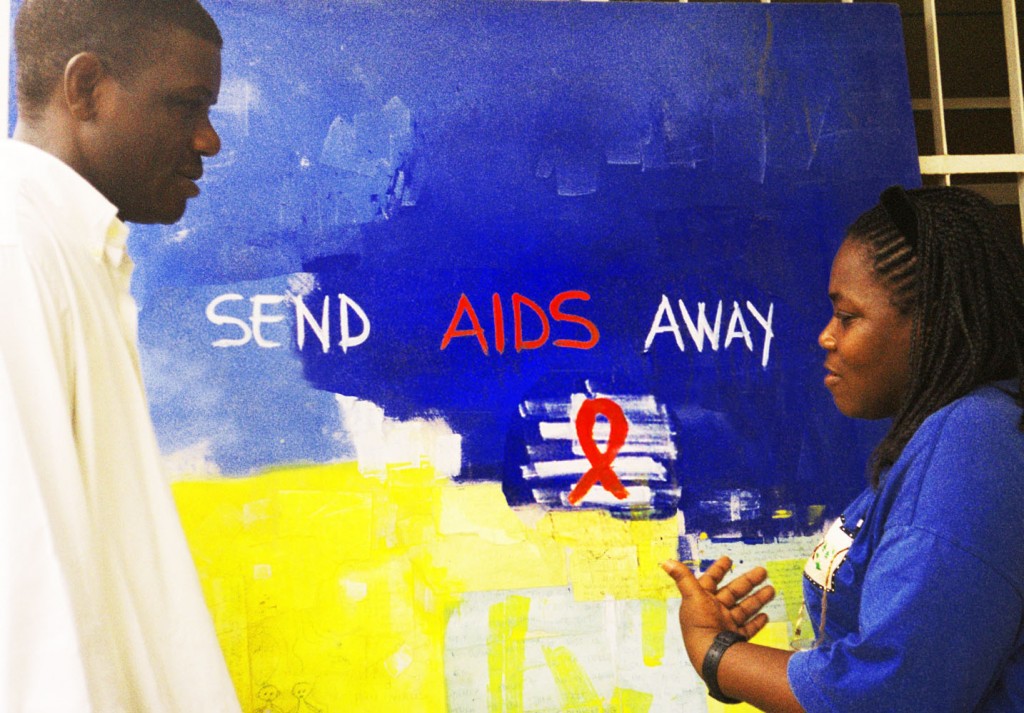
By M. Sayagues
Marie Mendene is an extraordinary activist from Cameroon and one of the first African women to say publicly that she lives with HIV, in the 1990s, when AIDS was a disease of shame and blame.
This is one of my favourite photos about AIDS in Africa. I took it at Sunshine, her NGO in Douala, in 2003, before antiretroviral treatment became widely available. Only a few Cameroonians in cities could get the life-saving pills.
The day I took the photo, Marie had queued for seven hours and received only half of her monthly ARV pills. She was understandably upset about the poor logistics and delivery of medicines. AIDS magnified all the inadequacies of health systems.
That was then. Today, nearly three million people in Africa are on ARV treatment. This seemed like a dream then, but activists were campaigning hard to make it come true.
Marie had a clear vision of activism. “We should go beyond the begging bowl and the appeal to compassion, beyond the stage of being used to do prevention and awareness, and become part of real-decision making around AIDS,” she told me.
Marie is to the right in the pic, with a fellow activist.
]]>What had tongues wagging was citizen’s journalism, dispatches by ordinary folk about electoral irregularities from the Rovuma to the Maputo rivers.
Good stuff: government cars illegally used for campaigning, [...]]]>
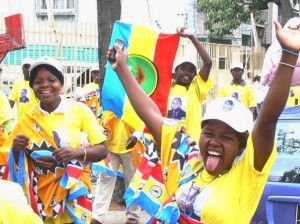
The sisters can do it by themselves. By A. Vilanculos
The buzz in Mozambique during the recent elections was not the TV debate among presidential candidates debate (there is none) or their programs (all vague).
What had tongues wagging was citizen’s journalism, dispatches by ordinary folk about electoral irregularities from the Rovuma to the Maputo rivers.
Good stuff: government cars illegally used for campaigning, with cellphone pics of their registration plates (until officials wised up and started covering up plates and ministry logos with party posters). Reports of youth tearing downs other party’s posters, fistfights, intimidation, and police lack of impartiality.
On election day, people told of late opening of polling booths and misbehaviour of poll officials and party observers.
Information was relayed by a network of 110 correspondents in 11provinces (most community radio reporters) and concerned citizens who texted, phoned and emailed.
The information was fact-checked and collected in a daily bulletin produced by the Centro de Integridade Publica (an NGO anti-corruption monitor).
The bulletin, in Portuguese and English, was emailed as pdf to some 3,000 subscribers, who redistributed it to at least double this number, and was widely reproduced, for free, by the local press, especially the 60+ community radio stations.
This was watchdog citizen journalism at its best.
Thanks to the Bulletin, Mozambicans had balanced coverage of the pre-poll partial exclusion of the new kid in the block, the opposition MDM, of the instances of ballot box stuffing and the invalidation of 100,000 votes.
The Bulletin provided a credible, professional and impartial source of information, above party politics (Mozambican media is aligned with political parties, ideological blocs and economic interests).
Bits of similar projecst exist elsewhere in Africa but I don’t know of any other so well-rounded.
In Kenya, during the post-electoral conflict two years ago, people texted and phoned in reports of violence to a hotline set up by an enterprising NGO. The information was quickly confirmed and uploaded onto a web map. The press, donors, and people could keep tabs on which parts of Kenya were burning.
Ghana made good use of sms by citizen correspondents during its recent elections.
Imagine if women developed such a tool.
Imagine that the 50-50 Campaign for equal political representation in Malawi could track women candidates during the campaign and the polls, and keep tabs on the insults, the stone-throwing, and the intimidation of women candidates seen last year.
In South Africa, during the 15 days against Violence against Women that started this week, a daily bulletin could keep track of gender-based abuse, collecting reports from police, rape crisis centres, and shelters. This would provide a graphic picture of South Africa’s second epidemic, after AIDS.

Grab it now! Pic b y A. Vilanculos
Historically, women are the last to use new technologies. This time, we should grab it now!
Check the Take Back the Tech site for cool ideas on taking control of digital technology to end violence against women.
And not only digital – one idea I liked is to go for a walk with a chalk and write up your thoughts on public space.
Watch the sidewalks of my neighbourhood in Pretoria – have chalk and thoughts, will walk.
* Read IPS stories on femicide in Chile, forced sterilisation in Peru and gender-based violence elsewhere.
]]>